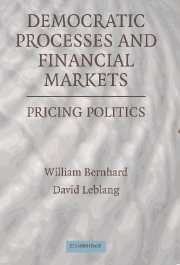Book contents
- Frontmatter
- Contents
- Acknowledgments
- 1 Introduction
- 2 Democratic Processes and Political Risk: Evidence from Foreign Exchange Markets
- 3 When Markets Party: Stocks, Bonds, and Cabinet Formations
- 4 The Cross-National Financial Consequences of Political Predictability
- 5 Cabinet Dissolutions and Interest Rate Behavior
- 6 Bargaining and Bonds: The Process of Coalition Formation and the Market for Government Debt in Austria and New Zealand
- 7 Time, Shares, and Florida: The 2000 Presidential Election and Stock Market Volatility
- 8 Polls and Pounds: Exchange Rate Behavior and Public Opinion in Britain
- 9 Conclusion: Political Predictability and Financial Market Behavior
- References
- Index
2 - Democratic Processes and Political Risk: Evidence from Foreign Exchange Markets
Published online by Cambridge University Press: 02 December 2009
- Frontmatter
- Contents
- Acknowledgments
- 1 Introduction
- 2 Democratic Processes and Political Risk: Evidence from Foreign Exchange Markets
- 3 When Markets Party: Stocks, Bonds, and Cabinet Formations
- 4 The Cross-National Financial Consequences of Political Predictability
- 5 Cabinet Dissolutions and Interest Rate Behavior
- 6 Bargaining and Bonds: The Process of Coalition Formation and the Market for Government Debt in Austria and New Zealand
- 7 Time, Shares, and Florida: The 2000 Presidential Election and Stock Market Volatility
- 8 Polls and Pounds: Exchange Rate Behavior and Public Opinion in Britain
- 9 Conclusion: Political Predictability and Financial Market Behavior
- References
- Index
Summary
Foreign exchange markets are among the deepest and widest financial markets in the world. Technological innovations and market liberalization have made currency markets enormous – by 1992, the volume of transactions topped over one trillion dollars each day. Moreover, economic agents can trade currencies with shocking speed – during the September 1992 EMS crisis, British monetary authorities expended over two billion dollars to support the pegged value of the pound in only a few hours. The behavior of currency markets can affect not only trade flows and international investment, key determinants of economic performance, but also political outcomes. With increasing capital mobility, political disputes over exchange rates have become highly salient, both at the domestic and international level. Indeed, some political economists assert that rapidly adjusting international markets may overwhelm the ability of policymakers to control policy, and, according to the most extreme view, thwart any meaningful democracy. Understanding how currency markets behave, therefore, is a fundamental step to assess accurately how the internationalization of economic activity affects democratic politics.
We investigate how democratic political events influence currency markets, focusing on the relationship between the spot and forward exchange rate markets. The efficient markets hypothesis implies that the forward exchange rate – the price of the currency deliverable 30 days in the future – should be an unbiased predictor of the future spot exchange rate. That is, today's 30-day forward rate should, on average, accurately predict the spot exchange rate one month from today.
- Type
- Chapter
- Information
- Democratic Processes and Financial MarketsPricing Politics, pp. 17 - 48Publisher: Cambridge University PressPrint publication year: 2006



